 Petzlover
Petzlover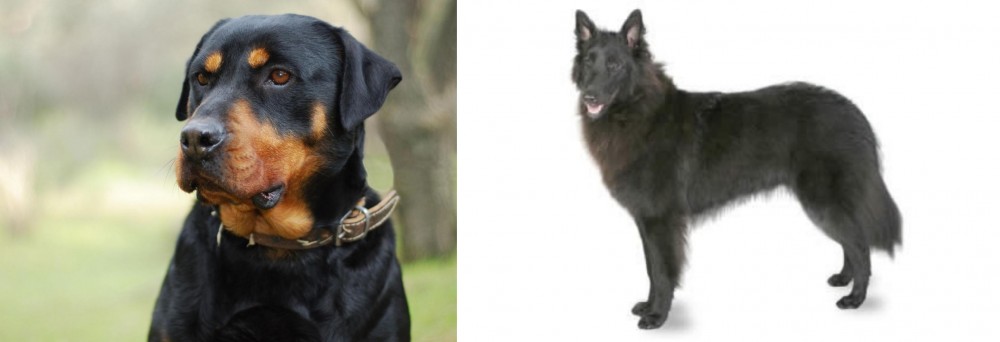 Rottweiler is originated from Germany but Belgian Shepherd is originated from Belgium. Both Rottweiler and Belgian Shepherd are having almost same height. Rottweiler may weigh 30 kg / 67 pounds more than Belgian Shepherd. Rottweiler may live 3 years less than Belgian Shepherd. Both Rottweiler and Belgian Shepherd has almost same litter size. Rottweiler requires Low Maintenance. But Belgian Shepherd requires Moderate Maintenance
Rottweiler is originated from Germany but Belgian Shepherd is originated from Belgium. Both Rottweiler and Belgian Shepherd are having almost same height. Rottweiler may weigh 30 kg / 67 pounds more than Belgian Shepherd. Rottweiler may live 3 years less than Belgian Shepherd. Both Rottweiler and Belgian Shepherd has almost same litter size. Rottweiler requires Low Maintenance. But Belgian Shepherd requires Moderate Maintenance
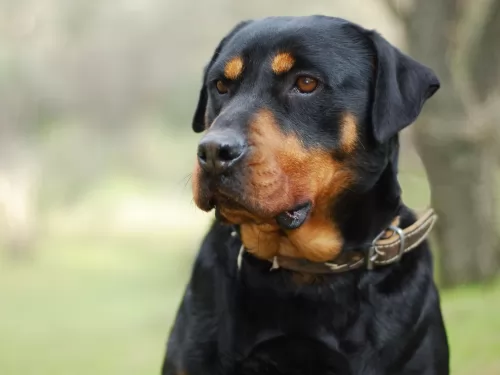 It is beleived to be the Rottweiler has been developed from the Roman cattle dogs. The Roman empire made a camp in a place at Germany in 74 AD. The area was called as 'das Rote Wil' and later as 'Rottweil'. In the middle ages Rottweiler was used in bear hunting and as a cattle dog. In 1899 the International club for Leonbergers and Rottweiler dogs was formed in Germany. In 19th century due to set in of railways the cattle was moved by railways and the need for the breed declined. When the world war was set in there came a heavy demand for police dogs. Rottweilers played a major role in first and second world war.
It is beleived to be the Rottweiler has been developed from the Roman cattle dogs. The Roman empire made a camp in a place at Germany in 74 AD. The area was called as 'das Rote Wil' and later as 'Rottweil'. In the middle ages Rottweiler was used in bear hunting and as a cattle dog. In 1899 the International club for Leonbergers and Rottweiler dogs was formed in Germany. In 19th century due to set in of railways the cattle was moved by railways and the need for the breed declined. When the world war was set in there came a heavy demand for police dogs. Rottweilers played a major role in first and second world war.
In 1921 many German Rottweiler clubs joined together to form ADRK, which is Allgemeiner Deutscher Rottweiler Klub. This is said to be the home club of Rottweiler. American kennel club recognised them in 1931. They become 9th most popular breed in America in 2013.
 There are different varieties of the Belgian Shepherd Dog – but these all differ only in color, length and texture of coat. The interesting aspect of the names of the different Belgian Shepherds, is that the names of the different varieties are taken from the individual towns in Belguim from which each variety comes from.
There are different varieties of the Belgian Shepherd Dog – but these all differ only in color, length and texture of coat. The interesting aspect of the names of the different Belgian Shepherds, is that the names of the different varieties are taken from the individual towns in Belguim from which each variety comes from.
This breed dates back to the middle ages, but it was only in 1891 that Professor A. Reul of the Cureghem Veterinary Medical School established standards for the types and actually separated- and distinguishing them. In the UK they are shown as one breed.
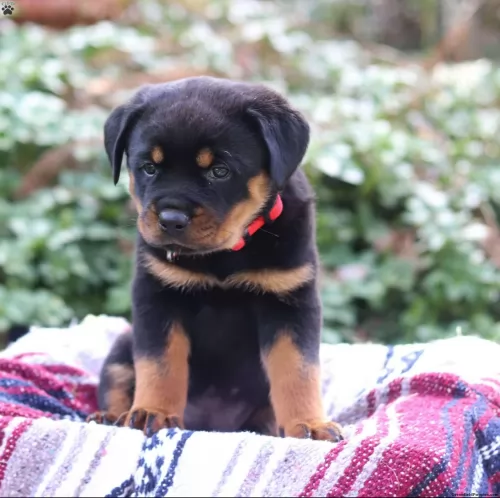 Rottweilers are good natured, obedient and are very much eager to work. They are calm, confident and an excellent watchdog. They will not make friends immediately. Rottweilers can be said as an all purpose dog since they are suitable as companion and watch dog as well. He is good in herding and guarding as genital feature. Rottweiler must be trained from its younger stage and should not be hit while training. They have high energy level and thus they are interested in doing work if properly trained. There are more possibilities of biting the strangers because of watchdog tendency.
Rottweilers are good natured, obedient and are very much eager to work. They are calm, confident and an excellent watchdog. They will not make friends immediately. Rottweilers can be said as an all purpose dog since they are suitable as companion and watch dog as well. He is good in herding and guarding as genital feature. Rottweiler must be trained from its younger stage and should not be hit while training. They have high energy level and thus they are interested in doing work if properly trained. There are more possibilities of biting the strangers because of watchdog tendency.
They are very good in herding sheeps as they have a natural gathering style. They are clever and adjusts the barking sound according to the situation. While herding they used to prove the leadership by selecting the dominant one in the flock and challenging it. If they were made to watch a same flock of cattle regularly, then they will develop a bond with them and will be affectionate with them as long as the cattle obeys its commands.
 The Belgian Shepherd is a well proportioned, muscular medium-to-large dog breed. There are the different varieties but they generally stands at 56 – 66cm in height and weighs anything from 25 to 30kg. You get the short haired Malinois and then you also get the Belgian Tervuren and the Groenendal which are fairly long-haired varieties. Their colour shades vary so you can find black with white markings on the chest and feet, you can find light to dark brown and some are even inclined to be brown.
The Belgian Shepherd is a well proportioned, muscular medium-to-large dog breed. There are the different varieties but they generally stands at 56 – 66cm in height and weighs anything from 25 to 30kg. You get the short haired Malinois and then you also get the Belgian Tervuren and the Groenendal which are fairly long-haired varieties. Their colour shades vary so you can find black with white markings on the chest and feet, you can find light to dark brown and some are even inclined to be brown.
All the varieties have long tails, pointed, fully erect ears and black noses. While the Belgian Shepherd isn’t an aggressive dog, he makes an excellent guard dog, being alert, highly energetic and intelligent and easy to train. As with most other dogs, you’ll want to see to it that he is trained and socialized because then he makes a super pet suited to life with a family where there are children and other pets. He has an independent nature and is loyal and protective with his human family.
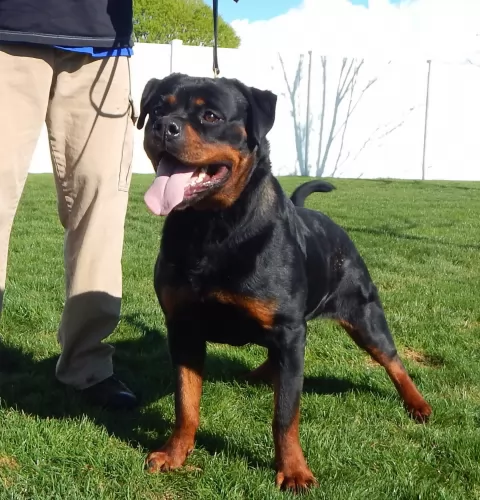 They are friendly with children and enjoy the company with them. But it is not advised to leave them with children without adult supervision.
They are friendly with children and enjoy the company with them. But it is not advised to leave them with children without adult supervision.
Rottweilers do not make friends immediately but take time to know about new people. He is an excellent watchdog. Males are quiet in nature but are watchful and females are more affectionate and obey some more. A good training is required for them to obey your orders.
They are not good for apartment life and thus a fenced back yard will be better for them to play and spend the energy. They require companion and will be happy to walk around with you. Hot weather will be some what better for them when compared with cold.
Rottweilers are easy to train because of their high intelligence. The training should be started in their young stage to have best results. They should not be dominated but treated kindly with understanding. They should be comfortable with the surroundings and people. Giving him a reward for training will make him interested in doing it. If he does a mistake then he should not be hit, so that he may get fear and loss his interest in doing it. Punishments will never work for them but rewarding will make him encouraged. Simple commands such as sit and stand shall be taught to them.
 Energy is a big factor with this beautiful dog, so before you consider one as a pet, be sure that you can take care of his exercise needs. He belongs to the working group of dogs so he won’t enjoy just lazing around day after day. He is wired to be herding livestock and that natural instinct doesn’t disappear once he becomes a pet in your home. With so much energy, he wants a nice sized garden and wouldn’t do well cooped up indoors at all.
Energy is a big factor with this beautiful dog, so before you consider one as a pet, be sure that you can take care of his exercise needs. He belongs to the working group of dogs so he won’t enjoy just lazing around day after day. He is wired to be herding livestock and that natural instinct doesn’t disappear once he becomes a pet in your home. With so much energy, he wants a nice sized garden and wouldn’t do well cooped up indoors at all.
He is a strong, loving dog, and in exchange for your care of him, he will be a loyal, loving, protective friend who will love you to the end.
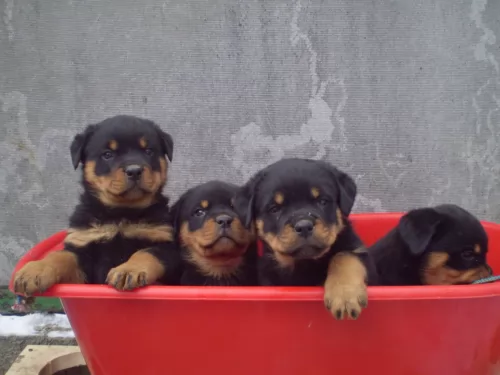 The health issues affecting the eyes of them are Cataract and Progressive Retinal Atropy. Health problems common in their joints are Hip Dysplasia, Elbow Dysplasia and Panosteitis. They also have chances to get circulatory system problems like Aortic Stenosis and Von Willebrand's Disease. Other common health problems in Rottweiler are Bloat and Cancer.
The health issues affecting the eyes of them are Cataract and Progressive Retinal Atropy. Health problems common in their joints are Hip Dysplasia, Elbow Dysplasia and Panosteitis. They also have chances to get circulatory system problems like Aortic Stenosis and Von Willebrand's Disease. Other common health problems in Rottweiler are Bloat and Cancer.
Mostly people think that Rottweilers don't shed but they are short haired dog and sheds more. They are having double coat that is undercoat and topcoat. The undercoat is softer and protects them in winter and topcoat is rougher and visible. It is said that they will shed in spring and winter seasons. Shedding can be reduced by brushing them.
 The Belgian Shepherd is a hardy dog so if you do your part to provide him with good quality nutrition from the food he eats and you exercise him, he’ll reach the 10-14 years allotted to him.
Just like with any dog, there will be some minor concerns that you need to watch out for -
The Belgian Shepherd is a hardy dog so if you do your part to provide him with good quality nutrition from the food he eats and you exercise him, he’ll reach the 10-14 years allotted to him.
Just like with any dog, there will be some minor concerns that you need to watch out for -
epilepsy, eye problems, cancer, skin allergies and hip dysplasia.
remember to check his teeth and for ticks and parasites as both, if just left, can jeopardise his health seriously.
see that he get his first puppy vaccinations at 6 to 8 weeks of age.
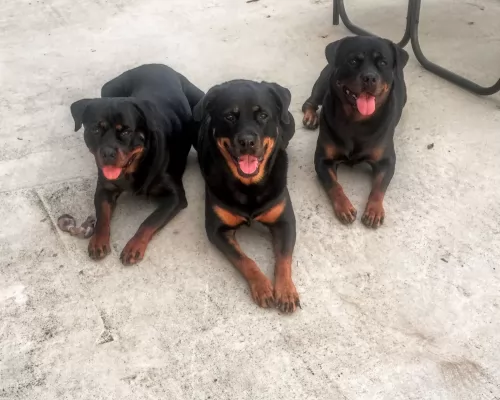 Rottweiler puppies should be given a diet which has protein, carbohydrates and fats. They need different diets in their growing stages. They can be given chicken with bones and vegetables for 4 days in a week. Beef with vegetables can also be given. When feeding them red meat a raw meaty bone can also be included. Fish oil can be given such that starting with 1000 mg and making it to 3000 mg in a time of two weeks.
Rottweiler puppies should be given a diet which has protein, carbohydrates and fats. They need different diets in their growing stages. They can be given chicken with bones and vegetables for 4 days in a week. Beef with vegetables can also be given. When feeding them red meat a raw meaty bone can also be included. Fish oil can be given such that starting with 1000 mg and making it to 3000 mg in a time of two weeks.
High calories of protein should be provided to them to meet their energy requirements. While buying commercial food it should be checked for the main ingredient to be meat. Protein levels should be more from animals than vegetables. High quality dairy products should be included. Food should not have low quality flavours and preservatives. Healthy fat is necessary for their skin and coat. If these fats are not provided it will cause dandruff and itchy skin.
Brushing them weekly once is recommended for their coat and skin. Buying the puppy from reputable breeder will be better. Vaccinations and preventive medicines should be given on right time. Spaying and Neutering should be done to avoid unwanted pregnancy. High quality diet should be maintained. Making them to bath once in a week is advisable. Nails should be trimmed once in every two weeks.
Rottweilers like to chase something and Laser pointer will be a good game for them. It will make them busy and also entertain us. But it should be on a limit and they should not get bored. A treat or toy can be hided and they can be made to find it. A bottle should be filled with water and frozen. The frozen bottle can be given to them for playing. In summer time it will make them very happy to play with it. A ball or toy can be thrown and they can be made to fetch it. Walking them is also a good exercise.
 Your Belgian Shepherd is an energetic dog breed who is social and who wants to be included in your family activities. You can’t just keep him cooped up in your back yard and expect him to do well. He’ll need daily exercise – walks, swims if there is water close by, chasing the ball as well as your companionship.
Your Belgian Shepherd is an energetic dog breed who is social and who wants to be included in your family activities. You can’t just keep him cooped up in your back yard and expect him to do well. He’ll need daily exercise – walks, swims if there is water close by, chasing the ball as well as your companionship.
These dogs are shedders so you’ll certainly be needing to watch your clothes for hairs. You will need to give them a good brush at least twice a week to get rid of all that loose hair and to keep his coat shiny and in tip top condition. Also, he likes the closeness the brushing provides between him and his human caretaker.
The Belgian Shepherd is a robust, healthy breed of dog, but many ill dogs are brought to veterinary clinics because they are suffering with itchy skin problems, they have digestive problems and they’re generally run down. This is because they aren’t provided with a varied and balanced diet plan. Apart from eating a quality dry- or wet dog food as recommended by your vet, he’ll most certainly need some raw meat in his diet too.